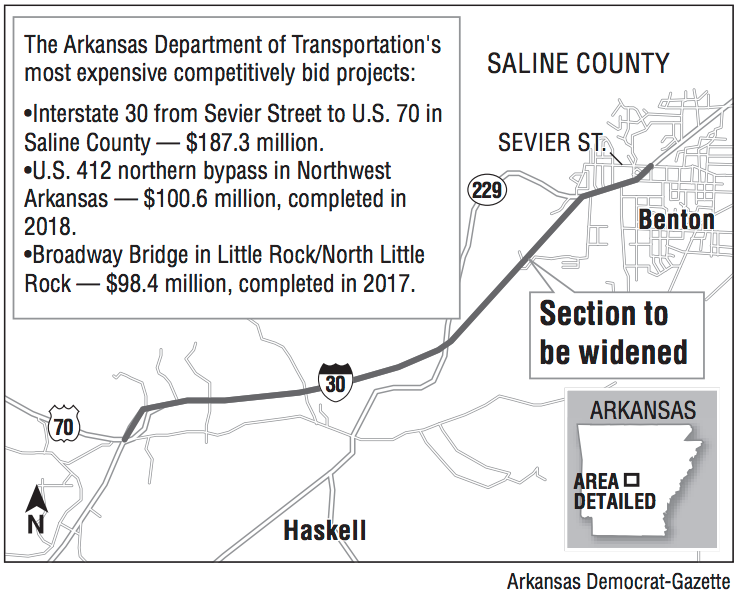Work is scheduled to begin today on the most expensive competitively bid road construction project the Arkansas Department of Transportation has ever undertaken.
The $187.3 million project to widen a 5.5-mile section of Interstate 30 from Sevier Street in Benton to U.S. 70 takes the crown from the U.S. 412 northern bypass in Springdale, which was completed last year at a cost of $100.6 million.
The price tag reflects the complexity of the project, which goes beyond widening the section to six lanes from four to more efficiently move the 81,000 vehicles that travel the section daily now, said Danny Straessle, the agency spokesman.
The project includes realigning the interchange and ramps at U.S. 67, a roundabout at South Street on the westbound I-30 frontage road, and bridge construction over the Saline River. The project is estimated to take 3½ years and be complete in late 2022.
"You're adding a third lane in both directions," Straessle said. "You also are replacing and resetting the grade on the existing lanes. One set of bridges cross the Saline River -- those have to be completely rebuilt.
"And it all has to be done under live traffic and we are maintaining two lanes in both directions as much as possible."
The initial work by the contractor -- Johnson Brothers Corp., a Southland Co., of Roanoke, Texas -- involves erosion control. Erosion control usually involves installing silt fencing to protect bodies of water, such as the Saline River, from dirt and pollutant runoff from the project during construction, he said.
Upcoming work also will include the installation of barrier walls, which serve to protect construction workers from traffic, and re-striping the traffic lanes.
Work won't ramp up until summer when the first major traffic shift is scheduled to take place. Traffic in both directions will be shifted to outside lanes to allow work in the median, the department said.
Twenty cameras to monitor traffic in real time are being installed. Once they go live, they will be available to the public through the department's iDriveArkansas.com website.
"There are lots of turns in the alignment," Straessle said. "There are a lot of curves and hills. We wanted to make sure we had all of them covered."
The project is among the three dozen regionally significant projects being built under the department's $1.8 billion Connecting Arkansas Program.
The program is financed in large part from proceeds of a 0.5 percentage point increase in the state sales tax voters approved in 2012 and scheduled to be in place 10 years.
The project will extend a widened I-30 to U.S. 70, a major corridor for traffic between Little Rock and Hot Springs, the state's tourism mecca, and, locally, serve a growing area of Saline County.
I-30 already is six lanes east to Sevier Street. The 18-mile section of U.S. 70 between I-30 and Hot Springs was widened to five lanes from two as part of a $78.5 million project under the Connecting Arkansas Program. It was completed last year.
The I-30 project will help increase mobility in central Arkansas, said Tom Schueck of Little Rock, the chairman of the Arkansas Highway Commission.
"It's a good project, it's a needed project" he said. "The pavement is worn out. The bridges are in bad shape."
The project also is expected to accommodate future growth.
Traffic is projected to climb 60%, to 130,000 vehicles daily, by 2038, according to Straessle.
Metro on 05/07/2019
